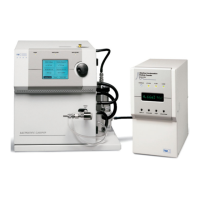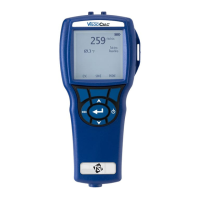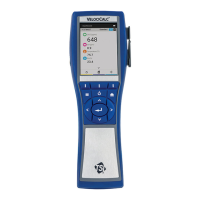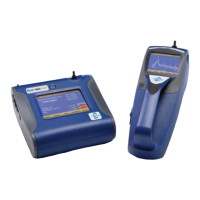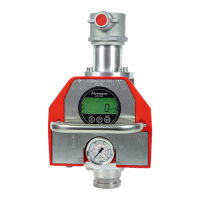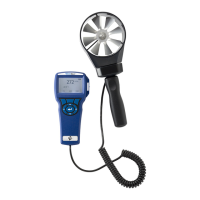Do you have a question about the TSI Instruments questemp 48n and is the answer not in the manual?
Introduces the QUESTemp° 48N model, engineered for DoD operations requiring hands-free monitoring.
Provides a step-by-step guide to get the QUESTemp° 48N operational, covering initial setup and basic functions.
Details the recommended placement of the QUESTemp° 48N for accurate readings, including height and tripod use.
Explains the function of each key on the QUESTemp° 48N keypad for user interaction and operation.
Illustrates and labels the keys on the QUESTemp° 48N instrument for easy identification.
Describes the initial screens displayed upon powering on the QUESTemp° 48N, showing model and battery status.
Explains the Index and Log Rate Start-Up screens, detailing setup options and last logged sessions.
Shows the main menu of the QT48N, guiding users on selecting modes using arrow keys and the I/O Enter key.
Displays an example of the measurement screen, indicating run mode and numeric counters for events or sessions.
Explains the function of Globe, Wetbulb/Humidity, and Dry Bulb sensors in heat stress measurement.
Explains the WBGT index, combining temperature, humidity, radiant heat, and airflow for thermal comfort analysis.
Defines Stay Times Indices, indicating safe work durations under heat stress conditions based on ACGIH, Navy PHEL, or Flag conditions.
Explains how to use the sensor bar remotely via a cable for measurements in different environments.
Describes the 'View' mode, which displays measured data without logging, and how to navigate between sensor sets.
Illustrates the main menu and shows how to view measured data, indicating the last logged event or session.
Lists and explains the various setup parameters available for the QUESTemp° 48N, including units, language, and logging.
Guides users on how to select and modify setup parameters using the instrument's keypad and display.
Explains how to navigate to and change the temperature units (Fahrenheit/Celsius) within the setup menu.
Describes the process for printing data to a serial or parallel printer or a computer, including required cables.
Explains how to reset the instrument to clear logged data from memory using the I/O Enter key.
Details how to begin and end a data logging or event logging session using the Run/Stop key, indicated by an asterisk.
Explains session/event log numbers and the run mode indicator (*).
Lists the various measurement screens (Wet/Dry, Globe/RH, WBGT, Time/Date) accessible on the instrument's display.
Shows the Battery and memory screen, displaying battery voltage and available logging memory in days.
Displays Navy PHEL stay times, indicating recommended working hours based on WBGT levels.
Presents ACGIH recommended working minutes per hour for different workload categories (Light, Moderate, Heavy, Very Heavy).
Explains the Navy/Marine Corp. heat condition flag system, providing guidelines based on WBGT levels.
Describes how sensor data is recorded at user-set intervals, with each session logged with time, date, and summary.
Provides a table illustrating the number of logging days available based on log rate and the number of sensors used.
Outlines the procedure for checking electronic sensor accuracy using a verification module and comparing readings to a known source.
Details the process for aligning the RH sensor using high or low concentration salt solutions for accurate humidity readings.
Shows the Alignment screen menu, explaining how to select High or Low for RH sensor alignment.
Illustrates removing the sunshield and placing a finger cot over the RH sensor to stabilize readings during alignment.
Demonstrates the RH alignment process using a low concentration salt, showing how to adjust and store the sensor alignment level.
Shows the RH alignment screen for high concentration salt, explaining how to adjust and save the sensor alignment percentage.
Explains using TSI Detection Management Software (DMS) or HyperTerminal for downloading, storing, graphing, and printing reports.
Provides an example of a summary data panel report generated from DMS, showing various logged measurements.
Details direct ASCII printing to parallel printers, including necessary cable connections and printer readiness.
Displays sample printouts from the QUESTemp° 48N, illustrating data format for different events and sensors.
Guides users on replacing the 9-volt alkaline battery, including warnings and battery voltage checks.
Lists approved 9-volt alkaline battery models recommended for use with the QUESTemp° 48N.
Lists the parameters measured by the QUESTemp° 48N, including temperature units and supported indices.
Details the capabilities of the data logging and event logging modes, including logging intervals and memory capacity.
Describes the sensors used in the QUESTemp° 48N, including their type, accuracy, and ranges.
Provides the physical dimensions and weight of the QUESTemp° 48N, including the mounted sensor assembly.
Explains the capability of the remote sensor bar and its maximum cable length for measurements.
Presents a block diagram illustrating the internal components and data flow of the QUESTemp° 48N heat stress monitor.
Provides ACGIH screening criteria for heat stress exposure, listing WBGT values for work/recovery and action limits.
Lists clothing corrections in Celsius that are added to the WBGT for stay time lookups.
Introduces the U.S. Navy Physiological Heat Exposure Limits (PHEL) Time Table, showing recommended working hours based on WBGT.
Details the PHEL curves from the U.S. Navy, showing total exposure time in hours and minutes for various WBGT levels.
Details the heat stress monitoring flag conditions for U.S. Navy/Marine Corp. ashore, correlating WBGT levels with flag colors.
Lists various optional accessories available for the QUESTemp° 48N, including sensors, cables, and cases.
Provides a brief overview of the TSI Detection Management Software (DMS), covering data downloading, setup, and viewing.
Explains the steps for connecting the QUESTemp° 48N to a computer and downloading data using DMS software.
Illustrates the process of communicating with the QUESTemp° 48N and DMS, including selecting the download option and model type.
Describes the Data Finder page where downloaded data is stored by instrument family and model, with options to analyze or print reports.
Explains how to generate a Quick Report from downloaded data, including basic information and a summary table.
Details the 'Analyze' function, allowing users to add and customize charts/graphs for reports by arranging panels.
Provides contact information for technical support, including telephone numbers and email addresses for different regions.
Lists contact details for customer service and instrument returns, including website and regional phone numbers.
Guides users on the process of returning the instrument for service, including required information and packing instructions.
Recommends regular factory examination and annual calibration for the QUESTemp° 48N and its calibrator devices.
Details the limited warranty terms for the QUESTemp° 48N, including exclusions and liability limitations.
Outlines the service policy for prompt attention to instrument malfunctions, directing users to contact sales offices or customer service.
| Wireless communication | No |
|---|---|
| Data Logging | Yes |
| Heat Stress Index | WBGT (Wet Bulb Globe Temperature) |
| Accuracy | ±0.5°C |
| Resolution | 0.1°C |
| Dimensions | 8.9 cm |
| Compliance | CE |

